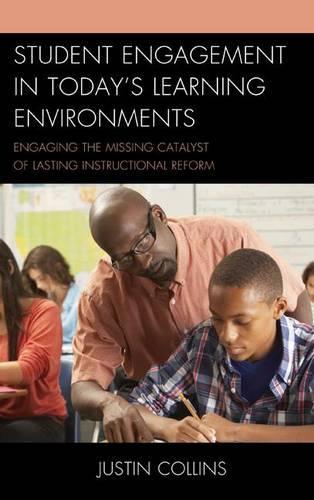
Student Engagement in Today's Learning Environments: Engaging the Missing Catalyst of Lasting Instructional Reform
(Paperback)
Available Formats
Publishing Details
Student Engagement in Today's Learning Environments: Engaging the Missing Catalyst of Lasting Instructional Reform
By (Author) Justin A. Collins
Bloomsbury Publishing PLC
Rowman & Littlefield Publishers
1st May 2014
United States
Classifications
Professional and Scholarly
Non Fiction
Schools and pre-schools
Educational strategies and policy
Teaching skills and techniques
371.207
Physical Properties
Paperback
222
Width 153mm, Height 226mm, Spine 17mm
336g
Description
As long as the free market has reigned, private sector firms have confronted a produce-or-perish existence. For a host of reasons, public organizations increasingly face these competitive pressures as well. But public organizations in the most unexpected of places have answered the call to evolve productively with fantastic success. Unfortunately, public schools can rarely be counted among them. Faddish acronym school improvement plans always offer grand results and almost never deliver upon such promises. Understandably, the farther public educational quality slides into decline, the sharper the urge to grope for radical reform plans. This book, in contrast, argues that a key element of reform has remained in plain view for decades but has gone unmentioned, unmeasured, and unused in reform plans: student engagement. More specifically, quantifying how the instructional time is passed provides not only a sound proxy to educational quality, but is shown to be tightly linked to the test score needle. Of course, the differences across school types and geographies are pronounced. Mindful of such differences, this book discusses each school type according to the hard numbers across buildings.
Reviews
At a time when public education is both vital for democracy and under attack, Justin Collins offers well-documented and sensible suggestions for educational programs that will train the citizens and leaders for the twenty-first century. A challenging and vibrant read. -- Mark A. Graber, professor of law, University of Maryland
Justin CollinsStudent Engagement in Todays Learning Environmentsis a refreshing new deep-dive into school reform.Collins moves us beyond polarized educational debates and mindless punitive accountability to get to the very heart of the matter. -- James Paul Gee, Arizona State University
Dr. Justin Collins has produced a book that addresses the transformative effort to rehabilitate the educational system of the country. He concisely points out the need for reform, and he points the way toward addressing the problems educators face in improving the learning environment. His system of classroom observation and follow-up conferencing is a model that can produce the necessary improvements in classroom instruction. Implementing his system in a school easily can improve what happens in the classroom. His book should be on every educators list of 'must reads.' -- Glen I. Earthman
Collins offers an interesting and thought-provoking read.What comes across clearly is the fact that education has changed, as it should. Student Engagement in Todays Learning Environments will assist in closing gaps; as it addresses various misconceptions related to social issues in public education. -- Marvin Henderson, deputy superintendent, Leon County Schools, Florida
In an insightful and engaging manner, Collins makes the case that if educational reform efforts are to be successful, the primary focus of such efforts must begin and end with meaningful and engaging instruction in every classroom, every day. -- Paul Johnson, Ph.D., associate professor, Bowling Green University
Justin Collins in-depth look at what successful reforms should bring more clarity to the phrase: 'It takes a village to raise a child.' The 'village' is more than a district; its our educational system as a nation that must make sure ALL children are prepared to compete in the 21st century. -- Duane Coleman, associate superintendent, Oceanside Unified School District, California
Author Bio
Justin A. Collins holds undergraduate and Masters degrees from the University of Virginia, along with MBA, Ph.D. (K-12 Educational Administration), and law degrees from the University of Missouri. Collins returned home to southwest Missouri, and currently resides in Springfield.
